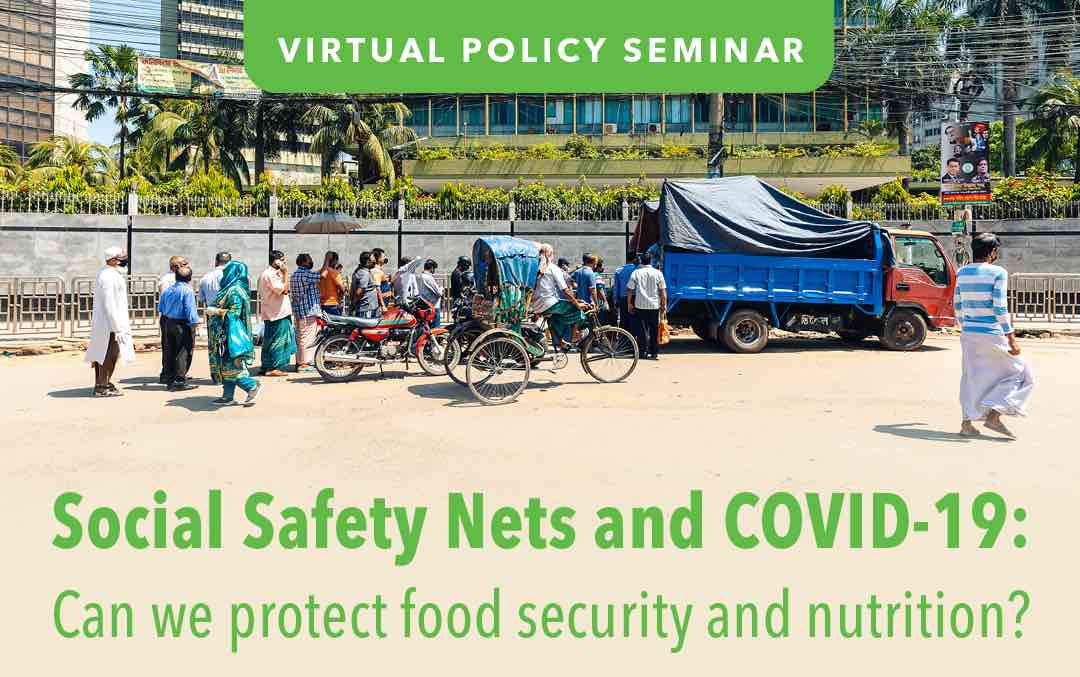As countries grapple with the health and economic shocks caused by COVID-19, an IFPRI estimate indicates that 140 million people globally are at risk of falling into extreme poverty. Many governments have expanded social safety net systems in order to mitigate the risks. A June 11 virtual event—co-organized with the CGIAR Research Program on Policies, Institutions, and Markets (PIM)—focused on social safety nets in COVID-19 response and their role in sustaining food security and nutrition.
“Past IFPRI research shows that social safety nets can help limit further harm among vulnerable populations by bolstering food security and assets, and with the potential to protect child nutrition with effective program designs,” said Daniel Gilligan, Deputy Director of IFPRI’s Poverty, Health, and Nutrition Division. However, the unprecedented nature of the pandemic also poses new challenges—such as how to safely deliver food and cash transfers without increasing exposure to the novel coronavirus and how to target newly vulnerable households.
“I think there is little doubt that we are in the middle of one of the largest social protection scale-up efforts in modern history,” said Ugo Gentilini, Senior Economist of the Social Protection and Jobs Global Practice at the World Bank. The number of countries that have planned or introduced social protection measures in response to COVID-19 quadrupled from 45 countries to 190 countries worldwide between late March and early June, and 988 social protection measures benefiting 1.7 billion people had been implemented, a tenfold increase.
Yet only 15% of those measures are related to food consumption, nutrition, and food security. In many impoverished regions, social protection coverage remains low and grants remain inadequate to fully support beneficiaries. For example, in Africa, the coverage of cash transfers is only at 2%, and spending per capita is equivalent to the Middle East while undernourishment levels are twice as high.
Following Gentilini’s global overview, presenters focused on Bangladesh and Ethiopia, two countries with extensive social safety net systems that IFPRI and its partners have studied for years.
“To respond to the coronavirus pandemic, the [Bangladeshi] government’s approach is to combine new benefits with an expansion of several existing social safety net programs,” said Mamunur Rashid, Bangladesh Programme & Policy Officer with the World Food Programme (WFP). In Bangladesh, social protection programs have expanded to support newly vulnerable communities such as those unemployed due to COVID-19, and the government has employed innovative methods to distribute cash transfers such as using ID numbers and mobile wallet apps to reduce risk of coronavirus transmission.
Partnering with the WFP, IFPRI conducted the Transfer Modality Research Initiative (TMRI) study to determine the most effective safety net design that reduces household poverty, improves food security, and enhances child nutrition in rural Bangladesh. The findings show that (pre-pandemic) both cash and food transfers significantly improved food security in extremely poor households. “Moreover, among children of women who receive cash plus nutrition behavior change communications, stunting was reduced by three times the national average decline,” said IFPRI Senior Research Fellow and TMRI Project Lead Akhter Ahmed.
Ahmed highlighted several ways to make safety nets COVID-19-sensitive. Due to disrupted markets and restricted in-person contacts, there should be free distribution of nutritious food and vouchers to the urban poor, a demographic which the Bangladesh safety net system largely overlooks. The government should also temporarily waive conditions for receiving assistance, making it easier for existing beneficiaries to access food and cash.
In Ethiopia, the government has added new measures to the Productive Safety Net Program (PSNP), its flagship social program, in response to COVID-19. These adaptations include issuing advance payments, enforcing social distancing at food transfer sites and markets, and providing additional support to pregnant and breastfeeding women.
In order to support the Ethiopian government’s COVID-19 measures, the Strengthened PSNP4 Institutions and Resilience (SPIR) program also made some adaptations such as facilitating advance transfers, providing home visit nutrition counseling, and improving hand-washing facilities. “The SPIR programming also helped the participant to be resilient and better prepare for COVID-19,” said Tigist Mamo, the SPIR Health and Nutrition Technical Lead of World Vision, citing SPIR’s additional supports for households such as opportunity for savings, access to loans, and homegrown feeding programs.
IFPRI has been collecting short-term data from PSNP and SPIR beneficiaries to assess the effectiveness of social safety nets during the pandemic. Among almost 700 households surveyed, 80% reported an income decrease, demonstrating the serious economic toll of COVID-19 and subsequent lockdowns on families. Households are coping with the disruptions by selling assets and relying on savings, in addition to receiving public assistance. The findings suggest the importance of social protection programs like SPIR, which allow families to build up assets and savings to rely on during short-term economic shocks. “It will be very important to track the longer-term effects of these coping mechanisms on households’ welfare, nutrition, and their broader resilience,” said IFPRI Research Fellow Jessica Leight.
After the global pandemic, innovative approaches and expansion for social protection programs will still be needed to continue addressing systemic social and economic disparities and in moving toward long-term solutions. “We need to shift social protection somewhat to a new equilibrium in a way that addresses those structural issues,” Gentilini said, “this will serve countries well in normal times as well as establishing a pipeline for crisis support during pandemics and other crises.”
Khiem Nguyen is an IFPRI Communications Intern.







